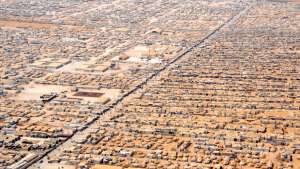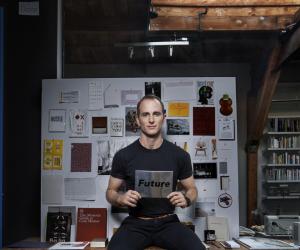From the Series
Airbnb co-founder Joe Gebbia started his session on the 2017 Design Indaba Conference stage by tossing rolls of duct tape into the audience.
Strange, you may think, for a man who helped create one of the most successful startups in the world. A startup that has attained over 160 million guest arrivals to date, including over 250,000 in Cape Town (site of the conference) in the past year alone. In fact, Airbnb itself started as a "Duct Tape Solution" to a design conference accommodation crisis. Gebbia and his roommate (and co-founder) Brian Chesky needed money to pay their increased rent and had an air mattress to offer for those looking for a place to sleep. They create a simple website which, with the aid of their friend and final co-founder Nate Blecharczyk, eventually became Airbnb.
The past ten years have given Gebbia and his team a lot of experience when it comes to understanding what encourages people to host strangers in their homes. It was with this in mind that they decided to try to find a duct tape solution to improve the process of refugee resettlement.
Back in design school, Gebbia explained, one of his professors told him "Duct tape is the sign of a design opportunity.” When you spot duct tape in the world, it means something was designed with a flaw, and there is an opportunity to improve it.
Gebbia wondered how Airbnb could design a solution to help refugees in need of short-term accommodation upon arrival in their new country. This is how We Accept was born, as a way for people to offer free accommodation to refugees. More than 16,000 people have already signed up.
The project was so successful that they expanded it to include those who cannot provide accommodation but would like to offer to host a refugee family for dinner. They also repurposed one of their current product’s early prototypes to give refugees in Amman, Jordan, a way to earn a livelihood.
Today, this “Experience Marketplace” enables locals, whatever their nationality, to share their passions interests knowledge skills with travellers from around the world, enriching the visitors’ experience as well as their own, and allowing them to earn a living rather than being forced into idleness and isolation.
Gebbia’s team also worked on a solution to aid Japan’s ageing rural population; funding and designing—in collaboration with local architects and craftsmen—a community centre that also hosts Airbnb guests. Revenues from travellers’ stays go directly to the community cooperative who decides to use them.
The “Yoshino Cedar House,” already in operation, provides the entire village with a source of income, interest, and interaction with the outside world."I know design won't solve all of the world's problems. But if we play our part, we will spot enough duct tape to make a difference," Gebbia concluded.









